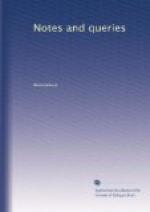“Farewell, a long farewell to all my greatness!”
In conclusion, allow me to remark, that I am quite content to have been anticipated by MR. SPEDDING in this discovery (if discovery you and your readers will allow it to be), for the satisfaction I am thereby assured of in the concurrence of so acute a critic as himself, and of a poet so true as the poet-laureate.
SAMUEL HICKSON.
Dec. 10. 1850.
* * * * *
THE CAVALIER’S FAREWELL.
The following song is extracted from the MS. Diary of the Rev. John Adamson (afterwards Rector of Burton Coggles, Lincolnshire) commencing in 1658. Can any of your readers point out who was the author?—
“THE CAVALIER’S FAREWELL TO HIS MISTRESS BEING CALLED TO THE WARRS.”
1.
“Ffair Ffidelia tempt no more,
I may no more thy deity adore
Nor offer to thy shrine,
I serve one more divine
And farr more great y{^n} you:
I must goe,
Lest the foe
Gaine the cause and win the day.
Let’s march bravely on
Charge ym in the Van
Our Cause God’s is,
Though their odds is
Ten to one.
{35}
2.
“Tempt no more, I may not yeeld
Although thine eyes
A Kingdome may surprize:
Leave off thy wanton toiles
The high borne Prince of Wales
Is mounted in the field,
Where the Royall Gentry flocke.
Though alone
Nobly borne
Of a ne’re decaying Stocke,
Cavaleers be bold
Bravely hold your hold,
He that loyters
Is by Traytors
Bought and sold.
3.
“One Kisse more and yn farewell
Oh no, no more,
I prethee giue me ore.
Why cloudest thou thy beames,
I see by these extreames,
A Woman’s Heaven or Hell.
Pray the King may haue his owne,
And the Queen
May be seen
With her babes on England’s Throne.
Rally up your Men,
One shall vanquish ten,
Victory we
Come to try thee
Once agen.
Query: Who was the author of the above?
F.H.
* * * * *
GRAY’S ELEGY.
J.F.M. (Vol. i., p. 101.) remarks, “I would venture to throw out a hint, that an edition of this Elegy, exhibiting all the known translations, arranged in double columns, might be made a noble monument to the memory of Gray.” It has been asserted that there is scarcely a thought in this Elegy that Gray has not borrowed from some writer, ancient or modern and if this be true, I would take the liberty of adding a hint to that of J.F.M., namely, that the proposed edition should contain a third column, exhibiting all the known plagiarisms in this famous Elegy. To begin with the first line—
“The curfew tolls the knell of parting day.”
Lord Byron, in his notes to the third canto of Don Juan, says that this was adopted from the following passage in Dante’s Purgatory, canto viii.:




